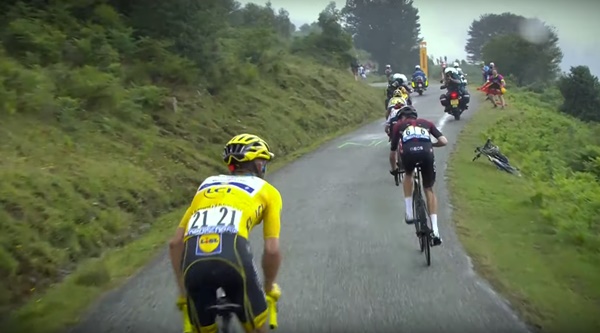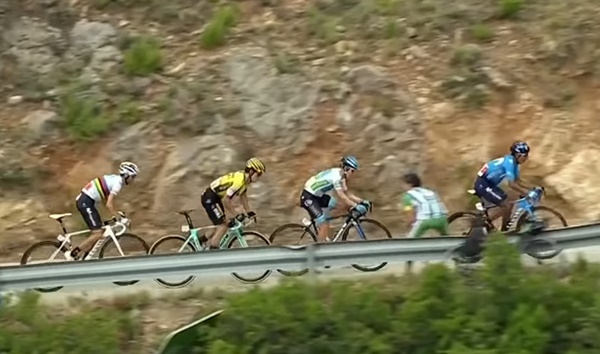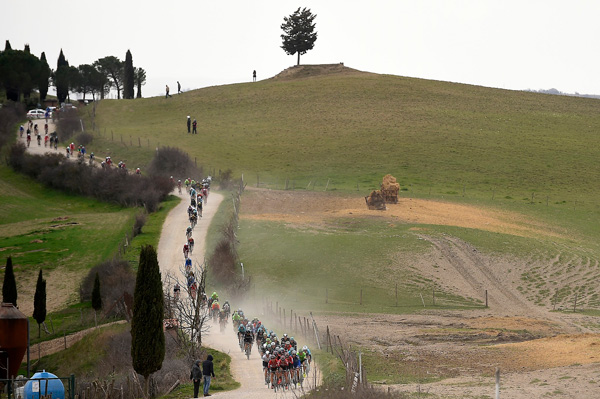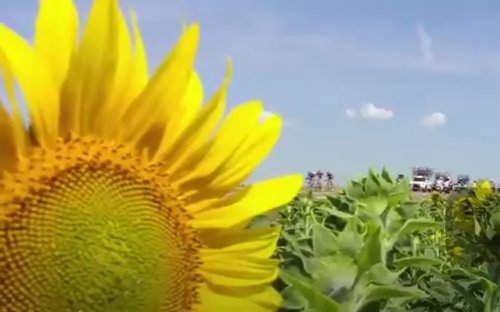
There is going to be a Tour de France. It is due to take place from Saturday August 29 until Sunday September 20.
It’s mad that they’re even trying to hold a three week race on public roads, but then if any sporting event can adapt to unexpected circumstances, it is the Tour de France.
Collisions with vehicles, extreme weather, collapsed roads. If the Tour is defined by anything, it is defined by things going very-much-not-as-planned and everyone just ploughing on anyway and working out all the details later.
So who is in form?
That’s an interesting question. Because nobody knows. There’s been no road racing for months.
We’ve had a bit of virtual racing, with two big highlights.
Number 1: Pierre Latour winking out of existence while leading the Virtual Tour de Suisse. “I told myself that I was going to leave like a moron,” said the Frenchman after concluding that his turbo trainer was giving overly generous power readings.
Number 2: The avatar of Olympic champion Greg van Avermaet failing to so much as bat an eyelid when a car passed an inch in front of (and quite possibly through) his front wheel during the same race.
But in terms of fitness for a Grand Tour, 30 minutes or so of indoor riding doesn’t really tell us a great deal.

We have to assume that the contenders will be the same blokes as always: Tom Dumoulin, Primoz Roglic, Thibaut Pinot, about half of Team Ineos Grenadiers (formerly Ineos, formerly Sky). All those guys.
A few pieces of relevant team news then…
- Dumoulin and Roglic are now on the same team, so Jumbo-Visma are definitely Ineos’s biggest rivals
- Last year’s Giro winner, Richard Carapaz, now rides for Ineos, so they’re even better than they were
- Chris Froome is leaving Ineos at the end of the season
The fact that that third one hasn’t actually happened yet doesn’t mean it isn’t important because there’s a definite vibe that Froome’s current team – the one he’s won seven Grand Tours for – isn’t mad-keen on giving him a glorious send-off.
There are occasional rumblings from within Ineos that maybe Froome hasn’t 100 per cent recovered top form after breaking all those bones 18 months ago. Whether it’s true or not, it’s a suggestion that’s sufficiently hard to disprove that they can probably get away with shunting him over to the Giro d’Italia or Vuelta a Espana instead.

If that sounds an odd thing to do, consider that they can still field the current Tour champion, Egan Bernal, alongside the previous one, Geraint Thomas. It might on the face of it sound even better to also have the guy who won the previous three Tours in your line-up, but actually it does start to get a bit messy from a man management point of view. So why risk it?
What’s next?
Brace yourselves for history’s shortest year. Cycling has decided to hold all its main races in the space of a couple of months. Needless to say, there is some overlap.
Strade Bianche – the Italian gravel roads race – is on Saturday with Milan-Sanremo the Saturday after and the Tour of Lombardy the Saturday after that.

Milan-Sanremo will be particularly interesting. It’s always a race anyone could win – sprinter, climber or someone in between – but this year you can’t even really narrow it down to the usual favourites because who knows how everyone’s training’s been going these last few weeks. It could be won by almost anyone.
After Lombardy, there’s a bit of a fallow week before the Tour de France (August 29 to September 20).
The Tour then brings the first major calendar clash because the men’s World Championships time trial takes place on the final day.
The World Championships road races take place the weekend after and the weekend after that (October 3) is the start of the Giro d’Italia, which runs until October 25.
A slightly shortened 18-stage Vuelta a Espana is due to overlap with the Giro, starting on October 20 and finishing on November 8.
The remaining spring classics – if we can call them that – are due to take place on weekends in October. The two biggest – the Tour of Flanders and Paris-Roubaix – clash with the Giro.
How are you going to cover all of this?
Fuck knows.
I mean obviously I’m not going to cover all of it – let’s get that straight for a start – but even allowing for that, I think we need to take a step back and reappraise the season.
Pro cycling is quite hard to follow and something I’ve always tried to do with this site is identify the important stuff. That’s why I’m forever linking to this page about which bike races actually matter.
That page doesn’t really do the job in 2020 though, so let’s ask the fundamental question that underpins those conclusions.
In which races will we see the best riders at their best?
The very obvious answer to that is the Tour de France. The Tour is a race sufficiently important that you might, if you were so inclined, name a website devoted to the broader pro road racing season after it.
It is the biggest race of all and the very best stage racers will be targeting it as always. Throw in the fact that you can ride it without missing out on any classics and it seems safe to assume that the best sprinters and one-day riders will be able to take part too.

If you were going to follow just one race this year, that’s the one to follow, so I guess I’ll try and write about it the same way I have been doing, with a preview and then three weekly recaps.
Beyond that, what you’d tend to think of as the next biggest races – the Giro, Flanders, Roubaix – are to some extent compromised by taking place at the same time as each other.
I think what this means is that it will be worth keeping an eye on the overall at the Giro, because there will be big names targeting that, but maybe the individual stage wins lose a bit of their lustre as the field as a whole will be slightly weakened.
This doesn’t quite work the other way. The guys going for the cobbled classics will be the same as always, so we can probably consider those to be fully serious races.
The one casualty in October may or may not be Liege-Bastogne-Liege, which tends to be won by the kind of rider who also targets Grand Tours. As it clashes with the Giro, none of those riders will be taking part. On the other hand, it comes a couple of weeks after the Tour, meaning the main contenders from that race might just give it a crack this year.
I’m not sure I’ll be able to serve up weekly Giro recaps this year, so coverage here might end up being a look back on the race as a whole. It probably makes sense to do a parallel October one-day race round-up too, covering those.
That leaves us with the three Italian one-day races in August – Strade Bianche, Milan-Sanremo and the Tour of Lombardy – and the Vuelta a Espana (which, I’ll be honest, seems like rather more of an afterthought than normal this year, but maybe it’ll get a few of the guys who rode the Tour).
So maybe an August classics recap and a Vuelta recap and all the other races can piss off.
Disclaimer: All writing plans for this website are provisional and at the mercy of time constraints, sloth, apathy and any number of other things. Some have suggested setting up a Patreon crowdfunding thing to help support the site, but maybe that’s one for next year.
Please sign up for our email to receive whatever actually gets written in the end.
Leave a Reply